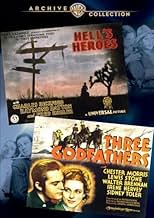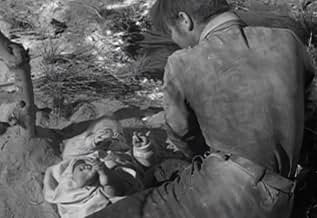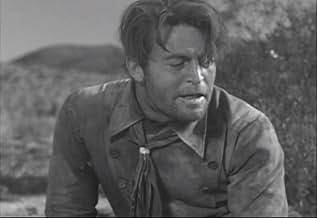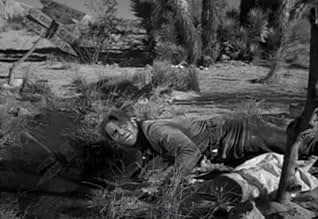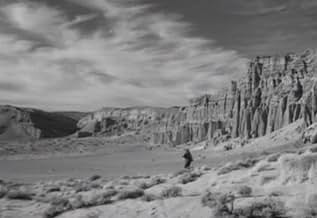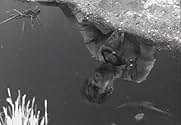IMDb-BEWERTUNG
7,3/10
1106
IHRE BEWERTUNG
Füge eine Handlung in deiner Sprache hinzuThree fugitives risk their lives to bring a newborn baby out of the desert to safety.Three fugitives risk their lives to bring a newborn baby out of the desert to safety.Three fugitives risk their lives to bring a newborn baby out of the desert to safety.
Jean Kircher
- Baby
- (as Jean Kirchner)
Bernard Carr
- Ralph
- (Nicht genannt)
Richard Cramer
- Prospector Dancing with Blackie
- (Nicht genannt)
Empfohlene Bewertungen
Though Chester Morris and Lewis Stone aren't exactly names identified with westerns, together with Walter Brennan they do a very nice job in bringing this earlier and harsher version of the story of Three Godfathers, outlaws who give an infant a chance at life.
Rather than the Three Godfathers from John Ford's later and more famous version, a trio of happy go lucky outlaws who rob a bank and get a posse after them, these are a much tougher group who drift into New Jerusalem one at a time. Morris is from there and hasn't got pleasant memories of the place. He's the one who wants to rob the bank and give a little payback to the town, especially to bank manager Robert Livingston who's going to marry Irene Hervey, Morris's former sweetheart.
Of course out on the desert the trio finds a dying woman with an infant and Brennan and Stone want to help, but Morris very reluctantly goes along. Let's just say that they meet a much meaner end than John Ford gave them in his version.
I do love the chemistry between Stone and Brennan, the college graduate who carries Shakespeare and Schopenhauer in his saddlebags and the illiterate nabob. Stone does not however demean Brennan at all and my favorite scene is him singing Boola Boola in the desert which Morris identifies for Brennan as Stone's old school song.
Richard Boleslavski does not give us the sweeping desert vistas of John Ford's Monument Valley, but this Three Godfathers has a class and dignity all its own. I wish it was broadcast more often.
Rather than the Three Godfathers from John Ford's later and more famous version, a trio of happy go lucky outlaws who rob a bank and get a posse after them, these are a much tougher group who drift into New Jerusalem one at a time. Morris is from there and hasn't got pleasant memories of the place. He's the one who wants to rob the bank and give a little payback to the town, especially to bank manager Robert Livingston who's going to marry Irene Hervey, Morris's former sweetheart.
Of course out on the desert the trio finds a dying woman with an infant and Brennan and Stone want to help, but Morris very reluctantly goes along. Let's just say that they meet a much meaner end than John Ford gave them in his version.
I do love the chemistry between Stone and Brennan, the college graduate who carries Shakespeare and Schopenhauer in his saddlebags and the illiterate nabob. Stone does not however demean Brennan at all and my favorite scene is him singing Boola Boola in the desert which Morris identifies for Brennan as Stone's old school song.
Richard Boleslavski does not give us the sweeping desert vistas of John Ford's Monument Valley, but this Three Godfathers has a class and dignity all its own. I wish it was broadcast more often.
A trio of desperadoes, fleeing from a violent Christmastime bank robbery, become THREE GODFATHERS after rescuing a dead mother's baby in the desert.
Here is a very fine little film, (largely forgotten due to its color remake years later starring John Wayne) which rewards the fortunate viewer with very good acting, excellent production values, some taut drama and a fair amount of humor.
Lewis Stone dominates the film as the thief with a conscience. Quietly intellectual & patrician, his tenderness for the infant is immediate and absolute. Stone's acting cannot be faulted; watching him painfully choose which of his beloved books to leave behind in the burning desert is to see a true artist at work.
Chester Morris does a dandy job of making the viewer both like and despise his character. Quick-tempered & revengeful, his attack upon the New Jerusalem bank is his opportunity to wreck havoc on both the town which rejected him and the decent young banker in love with his former sweetheart. Morris wants nothing to slow down his escape--not poisoned water holes or dead horses, and especially not a helpless baby.
Walter Brennan practically steals the entire movie with his portrayal of an old, illiterate outlaw whose childlike innocence and decency compels him to protect the infant. He also has some droll comedy sequences, especially at the Church Social, where he has a memorable encounter with a plate of asparagus. His scenes in the desert, with desperate thirst stalking his footsteps, show the consummate skill he would exhibit the rest of his life as one of America's favorite character actors.
In smaller roles, Sidney Toler is wonderfully droll as an itinerate dentist with a deadly aim; bucktoothed Victor Potel is his unfortunate customer. Rotund Roger Imhof plays the friendly sheriff of New Jerusalem; Dorothy Tree is the saloon hostess with a hankering for Morris. Pretty Irene Hervey does well as Morris' former love; her fiancé is nicely played by Robert Livingston, who finds the padding in his Santa suit to be most fortuitous.
Here is a very fine little film, (largely forgotten due to its color remake years later starring John Wayne) which rewards the fortunate viewer with very good acting, excellent production values, some taut drama and a fair amount of humor.
Lewis Stone dominates the film as the thief with a conscience. Quietly intellectual & patrician, his tenderness for the infant is immediate and absolute. Stone's acting cannot be faulted; watching him painfully choose which of his beloved books to leave behind in the burning desert is to see a true artist at work.
Chester Morris does a dandy job of making the viewer both like and despise his character. Quick-tempered & revengeful, his attack upon the New Jerusalem bank is his opportunity to wreck havoc on both the town which rejected him and the decent young banker in love with his former sweetheart. Morris wants nothing to slow down his escape--not poisoned water holes or dead horses, and especially not a helpless baby.
Walter Brennan practically steals the entire movie with his portrayal of an old, illiterate outlaw whose childlike innocence and decency compels him to protect the infant. He also has some droll comedy sequences, especially at the Church Social, where he has a memorable encounter with a plate of asparagus. His scenes in the desert, with desperate thirst stalking his footsteps, show the consummate skill he would exhibit the rest of his life as one of America's favorite character actors.
In smaller roles, Sidney Toler is wonderfully droll as an itinerate dentist with a deadly aim; bucktoothed Victor Potel is his unfortunate customer. Rotund Roger Imhof plays the friendly sheriff of New Jerusalem; Dorothy Tree is the saloon hostess with a hankering for Morris. Pretty Irene Hervey does well as Morris' former love; her fiancé is nicely played by Robert Livingston, who finds the padding in his Santa suit to be most fortuitous.
Three Godfathers (1936) was directed by Richard Boleslawski.
This could have been just another 1930's Western film, but that's not how things turned out. Naturally, the movie is outdated, but the basic plot isn't.
Three outlaws rob a bank and escape. They are confronted with an impossible situation--a young infant who will die unless they get him back to the town from which they've just escaped.
The outlaws are portrayed by Chester Morris, Lewis Stone, and Walter Brennan. The two women who love one of the outlaws are played by Irene Hervey and Dorothy Tree.
Some readers may remember Walter Brennan. He was a superb character actor, who won three Oscars. For me, none of the other actors were people whose names I recognized.
Nonetheless, the actors were all solid professionals. They had long and relatively successful careers. (Tree's career was cut short because she was blacklisted by the House Un-American Activities Committee.) The fact is, although none of them were marquee stars, they all could act. The professionalism shows through each frame.
I liked this movie because it started hard and ended that way. The three outlaws didn't have hearts of gold. They robbed the bank just before Christmas, when the bank held money people were saving for buying presents. They shot people who got in their way. The younger man was basically a sociopath, with no scruples about anything. Not a charming gang. That's what made the film interesting.
This is seen as a Christmas movie, and that part isn't subtle. The town they rob is called New Jerusalem. The film is set right before Christmas. Three men find a young child in the desert.
Nevertheless, the movie is realistic and moving. We saw it on a small screen. Probably it would work better in a theater, but I've never seen it screened. So, small screen is how you'll see it.
It's not a great film, but it's an excellent film. It has aged well, and is worth watching. I recommend it.
This could have been just another 1930's Western film, but that's not how things turned out. Naturally, the movie is outdated, but the basic plot isn't.
Three outlaws rob a bank and escape. They are confronted with an impossible situation--a young infant who will die unless they get him back to the town from which they've just escaped.
The outlaws are portrayed by Chester Morris, Lewis Stone, and Walter Brennan. The two women who love one of the outlaws are played by Irene Hervey and Dorothy Tree.
Some readers may remember Walter Brennan. He was a superb character actor, who won three Oscars. For me, none of the other actors were people whose names I recognized.
Nonetheless, the actors were all solid professionals. They had long and relatively successful careers. (Tree's career was cut short because she was blacklisted by the House Un-American Activities Committee.) The fact is, although none of them were marquee stars, they all could act. The professionalism shows through each frame.
I liked this movie because it started hard and ended that way. The three outlaws didn't have hearts of gold. They robbed the bank just before Christmas, when the bank held money people were saving for buying presents. They shot people who got in their way. The younger man was basically a sociopath, with no scruples about anything. Not a charming gang. That's what made the film interesting.
This is seen as a Christmas movie, and that part isn't subtle. The town they rob is called New Jerusalem. The film is set right before Christmas. Three men find a young child in the desert.
Nevertheless, the movie is realistic and moving. We saw it on a small screen. Probably it would work better in a theater, but I've never seen it screened. So, small screen is how you'll see it.
It's not a great film, but it's an excellent film. It has aged well, and is worth watching. I recommend it.
This is apparently the second remake of this film. While I have not seen the two prior versions, I did see the 1948 John Wayne remake and the two films are different enough (especially the endings--I preferred the more realistic way it was handled in this version) and I recommend you see both. And, overall I strongly prefer this film to the 1948 one.
Chester Morris was the main star in this film, though today he's mostly been forgotten despite the many films he starred in during the era. The other two co-star bandits are Lewis Stone (yes, the kindly "Judge Hardy" from the Hardy Family series) and Walter Brennan. All did a competent job and the entire movie is well written and directed and is far more watchable than the average Western. About the only problem, and it's a minor one, is that occasionally the film becomes a little bit too melodramatic and heavy-handed. But it also gets high marks for being less predictable and more entertaining that what you usually find in the genre.
Chester Morris was the main star in this film, though today he's mostly been forgotten despite the many films he starred in during the era. The other two co-star bandits are Lewis Stone (yes, the kindly "Judge Hardy" from the Hardy Family series) and Walter Brennan. All did a competent job and the entire movie is well written and directed and is far more watchable than the average Western. About the only problem, and it's a minor one, is that occasionally the film becomes a little bit too melodramatic and heavy-handed. But it also gets high marks for being less predictable and more entertaining that what you usually find in the genre.
Not as well known as the 1948 John Ford version, this one does not spoon feed the issues to the viewer. Harsh, uncompromising and utterly devoid of false bonhomie, Boleslawski made this at almost the same time as the screwball classic, THEODORA GOES WILD.
Wusstest du schon
- WissenswertesWhen the godfathers are dying of thirst, Walter Brennan asks Doc about a person in the bible who brought water out of a rock. Doc replies that that was Moses. The same exchange is made in another Walter Brennan classic, Northwest Passage. Only there the men are dying of hunger and the actor asking the question is Spencer Tracey. Answering is Robert Young. Brennan only looks on.
- Patzer(at about 45 mins) When Doc arrives to the place where the baby's mother is buried, there is a shadow covering only a small area where the rock pile and cross are. In the very next edit, the site is in total sunlight, with nothing nearby that could have cast such a shadow, too small and well-defined to have been cast by a cloud.
- Zitate
Robert 'Bob' Sangster: There ain't no Santy Claus!
- VerbindungenReferenced in Der unglaubliche Hulk: Two Godmothers (1981)
- SoundtracksShe'll Be Comin' 'Round the Mountain When She Comes
(uncredited)
Traditional
Played at the Christmas social
Top-Auswahl
Melde dich zum Bewerten an und greife auf die Watchlist für personalisierte Empfehlungen zu.
- How long is Three Godfathers?Powered by Alexa
Details
- Erscheinungsdatum
- Herkunftsland
- Offizielle Standorte
- Sprache
- Auch bekannt als
- Tres desalmados
- Drehorte
- Produktionsfirma
- Weitere beteiligte Unternehmen bei IMDbPro anzeigen
- Laufzeit
- 1 Std. 21 Min.(81 min)
- Farbe
- Seitenverhältnis
- 1.37 : 1
Zu dieser Seite beitragen
Bearbeitung vorschlagen oder fehlenden Inhalt hinzufügen

